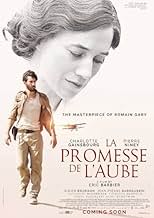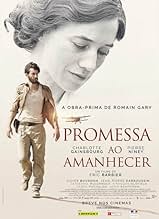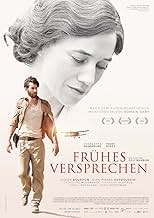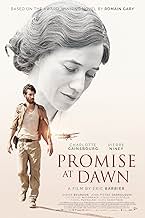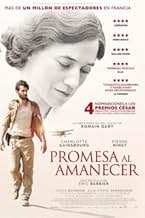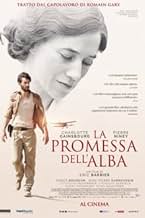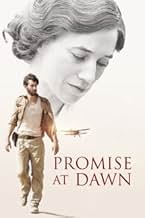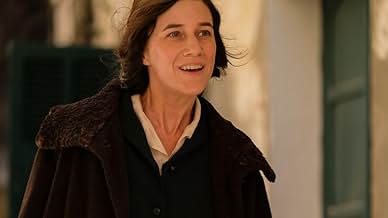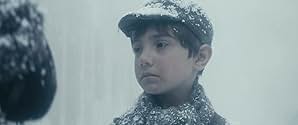La promesse de l'aube
- 2017
- Tous publics
- 2h 11min
NOTE IMDb
7,1/10
4,1 k
MA NOTE
Romain Gary a vécu une vie extraordinaire. Mais cet acharnement à vivre mille vies, à devenir un grand homme et un écrivain célèbre, c'est à Nina, sa mère, qu'il le doit.Romain Gary a vécu une vie extraordinaire. Mais cet acharnement à vivre mille vies, à devenir un grand homme et un écrivain célèbre, c'est à Nina, sa mère, qu'il le doit.Romain Gary a vécu une vie extraordinaire. Mais cet acharnement à vivre mille vies, à devenir un grand homme et un écrivain célèbre, c'est à Nina, sa mère, qu'il le doit.
- Réalisation
- Scénario
- Casting principal
- Récompenses
- 1 victoire et 7 nominations au total
Avis à la une
La promesse de l'aube (2017) is a French film shown in the U.S. with the translated title Promise at Dawn. The movie was co-written and directed by
Eric Barbier, based on a novel by Romain Gary. This is an autobiographical film, in which Gary is portrayed by Pierre Niney.
Gary was born in Poland, but became a renowned author in France. Some of what's in the movie is factual. The facts are exciting--Gary moved to France, and when the Germans conquered France, he joined the RAF.
One of the most exciting scenes in the movie shows Gary, as the navigator of a RAF bomber, talking the pilot--who is temporarily blinded--to the bombing target, and then back to the RAF airfield. (This actually happened.)
However, the movie isn't about Romain Gary's daredevil life. It's about Romain Gary and his mother, Nina Kacew, played by Charlotte Gainsbourg. If we are to believe the author, his mother played an immense role in his life--teaching him what he had to know, urging him on, and coming to him in dreams and hallucinations when she wasn't actually with him.
Who could have told us--other than Gary--how much of this was true? True of not, it certainly makes for an interesting script. The script only works because Gainsbourg is such a great actor. She's not always someone we like, but she's someone in whom we believe. I don't know another actor who could have pulled this off as well.
Incidentally, there's a confusing episode when the film starts. It's Day of the Dead in a small city in Mexico, and someone--we later learn that it's Gary--decides that he's dying and needs to go to a distant hospital in Mexico City.
Notice that the talented Catherine McCormack plays his wife, Lesley Blanch. Gary was a diplomat, and he and his wife were stationed in Mexico for a time, so maybe this really happened. (Gary later divorced Blanch and married Jean Seberg, darling of the French Nouvelle vague.)
I enjoyed this movie and would recommend it for people who like epics about famous, successful people. Promise at Dawn has a moderately strong IMDb rating of 7.2. I thought it was better than that, and rated it 8.
Gary was born in Poland, but became a renowned author in France. Some of what's in the movie is factual. The facts are exciting--Gary moved to France, and when the Germans conquered France, he joined the RAF.
One of the most exciting scenes in the movie shows Gary, as the navigator of a RAF bomber, talking the pilot--who is temporarily blinded--to the bombing target, and then back to the RAF airfield. (This actually happened.)
However, the movie isn't about Romain Gary's daredevil life. It's about Romain Gary and his mother, Nina Kacew, played by Charlotte Gainsbourg. If we are to believe the author, his mother played an immense role in his life--teaching him what he had to know, urging him on, and coming to him in dreams and hallucinations when she wasn't actually with him.
Who could have told us--other than Gary--how much of this was true? True of not, it certainly makes for an interesting script. The script only works because Gainsbourg is such a great actor. She's not always someone we like, but she's someone in whom we believe. I don't know another actor who could have pulled this off as well.
Incidentally, there's a confusing episode when the film starts. It's Day of the Dead in a small city in Mexico, and someone--we later learn that it's Gary--decides that he's dying and needs to go to a distant hospital in Mexico City.
Notice that the talented Catherine McCormack plays his wife, Lesley Blanch. Gary was a diplomat, and he and his wife were stationed in Mexico for a time, so maybe this really happened. (Gary later divorced Blanch and married Jean Seberg, darling of the French Nouvelle vague.)
I enjoyed this movie and would recommend it for people who like epics about famous, successful people. Promise at Dawn has a moderately strong IMDb rating of 7.2. I thought it was better than that, and rated it 8.
A great story, well told and represented. A good movie starts in a great script. French cinema continues to bring us the finest art.
Watched it on a recent flight to Paris and glad that I did since I probably wouldn't have paid to see it (not the biggest Gainsbourg fan) and would've missed out on a modern classic. The two main characters in the film, the mother (Gainsbourg) and the son (Niney) carry the film due to the inspired performances of the actors playing those roles. Gainsbourg, in particular, gave a finely-tuned, nuanced performance that perfectly captured the extraordinarily devoted yet overbearing character of Nina; I'm now a big fan! Also inspired were the cinematography and the breathtaking dogfight scenes, which were probably the best I've seen in any war film. The first half of the film does meander a bit and the pace of it gets a bit patchy (hence the 9 stars instead of 10) but the second half more than makes up for it. I didn't know the film was based on a true story (i.e. Romain Gary's biography) until I read the closing credits, which made it that much more impactful and emphatic since real people actually lived the epic events portrayed in the film. The closing credits also had another shock but I won't reveal it here so that I won't spoil the film! All in all, this was probably the best film I've seen in a long while; it felt genuine, engrossing and it left me with tears in my eyes, though the airplane food may have contributed to that.
I confess that I had great expectations and some emotions before seeing 'La promesse de l'aube'. Romain Gary was together with Boris Vian, the favorite French writer of my adolescence, and 'La promesse de l'aube' was one of my beloved books paired with Vian's 'L'ecume des jours'. The new version of the film (its second adaptation to screen) directed by Eric Barbier fully met my expectations.
The book and the film tell about two love stories. The first of these is the love of a mother for her son, an unlimited love, a love that is remembered by the writer over the years, a love that determined the course of his life. In most of the world's literature and languages for such a mother the common expression is 'Jewish mother', only in Hebrew such a mother is called a 'Polish mother'! Both fit here. The son's answer is, of course, the book that Romain Gary wrote decades later, the book that inspired the film. I can say without hesitation that this book is unique in the literature in its description of the relationship between a mother and her son. The second love story is for France. The book's heroine passionately loves her country of adoption, the country that saved her life, sheltered her, gave her the dignity. Nina Kacew educates her son to love France, returning the love that seems to have been offered to them unconditionally. However, none of the two love stories are happy to the end. Romain Gary's life will be cut short by suicide, and it is impossible to establish which were the sources of despair and disappointment that led to this, but it can not be ruled out that the partial failure of the life plan predestined by his mother had a role. The love of the Jews sheltered by France for their country and their readiness to return their gratitude with all sacrifices, including life, was hardly put to the test of history, from the Dreyfuss case to the racial persecutions and deportations during the Second World War. The book and the film end up in an optimistic note, but readers and viewers know this is not the whole story.
'La promesse de l'aube' is a captivating and exciting movie. Many viewers, probably, like me, know the intrigue and the characters, yet the precision of the details, together with the sensitivity and the passion of the actors, create a moving story that cannot leave the spectators indifferent. Charlotte Gainsbourg is fascinating as a woman living through several ages, struggling to survive and succeed, radiating the fierce love for her son, conveying her passion for life and her love for the adoptive country. All the three actors who represent the writer at different ages are excellently chosen and play very well, with a special mention for Pierre Niney who creates again a superb role and consolidates in my eyes his position as one of the best French actors of the moment. Watching the film not only did not disappoint me at any point in comparison with the emotions related to reading 'La promesse de l'aube' many decades ago, but added new dimensions to the intellectual experience around this exceptional book.
The book and the film tell about two love stories. The first of these is the love of a mother for her son, an unlimited love, a love that is remembered by the writer over the years, a love that determined the course of his life. In most of the world's literature and languages for such a mother the common expression is 'Jewish mother', only in Hebrew such a mother is called a 'Polish mother'! Both fit here. The son's answer is, of course, the book that Romain Gary wrote decades later, the book that inspired the film. I can say without hesitation that this book is unique in the literature in its description of the relationship between a mother and her son. The second love story is for France. The book's heroine passionately loves her country of adoption, the country that saved her life, sheltered her, gave her the dignity. Nina Kacew educates her son to love France, returning the love that seems to have been offered to them unconditionally. However, none of the two love stories are happy to the end. Romain Gary's life will be cut short by suicide, and it is impossible to establish which were the sources of despair and disappointment that led to this, but it can not be ruled out that the partial failure of the life plan predestined by his mother had a role. The love of the Jews sheltered by France for their country and their readiness to return their gratitude with all sacrifices, including life, was hardly put to the test of history, from the Dreyfuss case to the racial persecutions and deportations during the Second World War. The book and the film end up in an optimistic note, but readers and viewers know this is not the whole story.
'La promesse de l'aube' is a captivating and exciting movie. Many viewers, probably, like me, know the intrigue and the characters, yet the precision of the details, together with the sensitivity and the passion of the actors, create a moving story that cannot leave the spectators indifferent. Charlotte Gainsbourg is fascinating as a woman living through several ages, struggling to survive and succeed, radiating the fierce love for her son, conveying her passion for life and her love for the adoptive country. All the three actors who represent the writer at different ages are excellently chosen and play very well, with a special mention for Pierre Niney who creates again a superb role and consolidates in my eyes his position as one of the best French actors of the moment. Watching the film not only did not disappoint me at any point in comparison with the emotions related to reading 'La promesse de l'aube' many decades ago, but added new dimensions to the intellectual experience around this exceptional book.
Very good dramatic comedy about the impressive life of Jewish writer and military pilot Romain Gary (Kacew), his relashionship with his crazy, controlling and abusive mother (he loved her, but I did not see a so bad mother since Brian de Palma's "Carrie") and anti-Semitism during and before World War II. Quite dark humor for narrating a glorious but tragic life.
Le saviez-vous
- AnecdotesTo prepare the character of Nina, actress Charlotte Gainsbourg admits to have been inspired by her paternal grandmother, also of Russian origin.
- Citations
Roman Kacew, dit Romain Gary: I made the promise to straighten the world and lay it at his feet
- ConnexionsFeatured in ACS France (2018)
- Bandes originalesThe Twins
Composed by Max Richter
Meilleurs choix
Connectez-vous pour évaluer et suivre la liste de favoris afin de recevoir des recommandations personnalisées
- How long is Promise at Dawn?Alimenté par Alexa
Détails
- Date de sortie
- Pays d’origine
- Sites officiels
- Langues
- Aussi connu sous le nom de
- Promise at Dawn
- Lieux de tournage
- Bordighera, Imperia, Liguria, Italie(Interior and exterior scenes)
- Sociétés de production
- Voir plus de crédits d'entreprise sur IMDbPro
Box-office
- Montant brut mondial
- 9 242 157 $US
- Durée2 heures 11 minutes
- Couleur
- Rapport de forme
- 2.39 : 1
Contribuer à cette page
Suggérer une modification ou ajouter du contenu manquant

Lacune principale
What is the Spanish language plot outline for La promesse de l'aube (2017)?
Répondre

